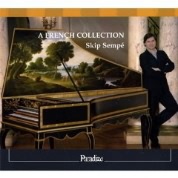When Skip Sempé plays mid-18th-century French harpsichord repertoire, the music speaks. Sempé’s fabulous technique and superb sense of timing allow him to shape melodies and ornaments in clear perspective, make agogic adjustments flow, and resolve cadences so that they feel more like points of arrival rather than mere endings. Even virtuosic passages taken in more-or-less strict tempos breathe, as you readily hear in respective Chaconnes by Louis Marchand and Jacques Duphly. The same holds true for Armand-Louis Couperin’s L’Intrépide, where Sempé’s subtle phrase distentions underline the harmonic quirks without pulling focus from the music’s overall march feeling.
Gentle though Sempé’s attractive instrument (based on 18th-century French models) may appear at the outset, it also can rise to near-orchestral impact when the harpsichordist literally pulls out all the stops, as particularly evident in Claude-Bénigne Balbastre’s La Suzanne and Joseph Nicolas Pancrace Royer’s Allemand. Every aspect of this release, from programming and annotations to the gorgeous engineering, reflects great care and forethought, and demonstrates why the CD still is a viable medium in the download age. [9/10/2009]
































